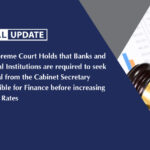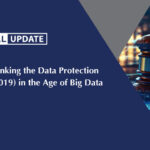-
- On 16th May 2018, Justice G.V. Odunga in Petition No. 412 of 2016- Dr. Robert K. Ayisi versus The Kenya Revenue Authority and Another delivered a landmark Judgement on the extent to which a Bank may disclose customer information for tax purpose to the Kenya Revenue Authority (hereinafter referred to as “KRA”)
- The Petitioner at the time of filing the petition was the acting County Secretary and Head of Public Service of the Nairobi County Government, an interested party in the Petition. The Petition was premised on a letter dated 14th March 2016 by KRA to the Petitioner seeking for details of the transaction between the Nairobi County Government and a Senior Advocate in respect of the period between 2009 to 2016 which information included details of Fee Note Numbers, Dates, Gross amount, VAT and nature of the payment.
- The said information was sought by the KRA pursuant to the provisions of Sections 56 of the Income Tax Act and Section 48 of the VAT Act, The Petitioner responded to the letter stating that the requested documents were in the possession of the Ethics and Anti-Corruption Commission and had not been returned.
- KRA thereafter caused the Petitioner to be arrested for failing to produce the documents requested after which he filed a petition seeking inter alia a declaration that Sections 44(1) and (2), 60 (1) and (3) and 59 (4) of the Tax Procedures Act 2015 (hereinafter referee to as “TPA”) are unconstitutional.
(a) Sections 44(1) and (2) of TPA authorized the Commissioner or an authorised officer to seize and forfeit any goods which he reasonably believes that the VAT or excise duty payable has not been or will not be paid.
(b) Sections 60 (1) and (3) of TPA provide for the powers to search any building, place property and documents and seize any property for the purposes of administering a tax law.
(c)Section 59 (4) of TPA provides that such powers shall have effect despite any law relating to privilege or the public interest with respect to the giving of information or the production of any documents and any contractual duty of confidentiality - In its Judgment, the Court ruled that, Sections 44 (1), 44 (2), 60 (1) and 60(3) of the TPA were unconstitutional on the grounds that they contravened Article 31 of the Constitution which guarantees the right to privacy, including the right not to have a person’s possessions seized. In holding this, the Court was of the view that personal and private domain is essential to sustaining a civil and civilized society, and that the contentious provisions were not in line with the Constitution.
- The Court also declared Section 59(4) of the TPA Act This provision in the TPA attempted to pierce the privilege rule (including advocate-client privilege) and confidentiality obligations by requiring a person, upon request, to furnish KRA with information protected by privilege or confidentiality obligation with respect to ascertaining the tax liability of a tax payer.
- The Judge acknowledged that the right to privacy is not an absolute right and that the same can be limited but only within the requirements outlined under Article 24 (2) of the Constitution.
- The legal question that arises therefore is whether a Bank and/or an entity will be justified in failing to produce documents in its possession when demanded by KRA. In other words, whether the decision aforesaid gives the Banks and/or financial institutions a blanket restriction to provide documents requested by KRA in the administration of tax law.
- Indeed, the decision brings into sharp focus the fiduciary nature of Customer-Bank relationship which is undergirded by absolute faith and trust. A question thus abounds as to the effect of the decision on the obligation, if any, of a bank to disclose a customer’s information for tax purposes.
(a)The Bank’s Duty of Confidentiality. - The relationship between a bank and a customer is a contractual relationship which begins when a customer opens an account with the bank. One of the implied duties of the bank towards its customer is the duty of confidentiality also known as the principle of bank secrecy.
- The confidentiality is not just confined to account transactions, rather it extends to all the information that the bank has about the customer which might include the customer’s business, his personal details, his banking history details and any other details within the bank’s knowledge and possession. The duty also continues even after the customer has closed his account with the bank.
- The English case of Tournier -Versus- National Provincial And Union Bank Of England: Ca 1924 held inter alia on the concept of bank secrecy:
“I have no doubt that it is an implied term of a banker’s contract with his customer that the banker shall not disclose the account, or transactions relating thereto, of his customers except in certain circumstances’ and ‘I doubt whether it is sufficient excuse for disclosure, in the absence of the customer’s consent, that it was in the interests of the customer, where the customer can be consulted in reasonable time and his consent or dissent obtained.” - Further to the above decision, the Court of Appeal of England and Wales in N Joachimson -Versus- Swiss Bank Corporation)[1921] All ER REP 92 held as follows in relation to the same:
“It is an implied term of that contract that the banker will not divulge to third persons, without the express or implied consent of the customer, either the state of the customer’s account, or any of his transactions with the bank or any information relating to the customer acquired through the keeping of his account, unless the bank is compelled to do so by order of a court, or the circumstances give rise to a public duty of disclosure or the protection of the banker’s own interests requires it.” - The Bankers duty of secrecy has further received statutory recognition. The proviso of Section 31 (1) the Banking Act provide that information so furnished shall not be published if it would disclose the financial affairs of any person, unless the consent in writing of that person has first been given. Publication in our understanding is sharing the said information with any other person or entity
- .However, there are exceptions to the rule that banks should not disclose to third persons information about its customers as was stated in the Court of Appeal decision in Standard Chartered Bank Kenya Ltd -Versus- Intercom Services Ltd & 4 others [2004] eKLR where the Court held:
“Some of these exceptions are where the Bank has a duty to the public to disclose; where disclosure is under compulsion of law; when the interest of the Bank requires disclosure; where disclosure is made by the express or implied consent of the customer – (see Tournier vs National Provincial And Union Bank of England, Ltd [1923] All ER 550 at page 554. Under those circumstances, the duty put upon the Bank not to disclose customer’s secrecy may be waived. The giving rise to the inquiries must meet the qualifications above.” - The exceptions as discussed hereunder relate to a situation where the Bank has been requested by a third party (including KRA) to provide certain information.
(b)Where disclosure is under compulsion of the law - The first exception provides that the bank is under an obligation to provide information about its customers under the compulsion of the law that is wherethere is a court order in place or where the statute provides an obligation to have the information disclose. In the present circumstances, the provisions of Sections 44(1) and (2), 60 (1) and (3) and 59 (4) of the Tax Procedures Act 2015 which were declared unconstitutional as outlined hereinabove.
- The provisions of Sections 99 and 100 of the Tax Procedures Act create a penal provision where any person who fails to provide information or produce any document to the commissioner or any authorised officer as provided under the Act commits an offence.
- From the foregoing, a request for information from the Bank under the provisions of Sections 44(1) and (2), 60 (1) and (3) and 59 (4) of the Tax Procedures Act 2015 is unlawful and the Bank would not be liable to any offence as stipulated under Sections 99 and 100 of the Tax Procedures Act, 2015 if it failed to avail such information
- Despite the above inference, a Commissioner or any other authorised officer who by other provisions of the law seeks information from the bank in order to administer a tax law shall be entitled to be provided with such information. An example is the provision of Section 140 (2) of the Evidence Act which provides inter alia
“No bank or officer of a bank shall be summoned or called as a witness to prove any matters, transactions or accounts recorded in a banker’s book except by order of a judge or magistrate made for special cause.” - The words “except by order of a judge or magistrate for special cause” mean that where the bank is served with an order of the Court to provide a customer’s information for the purposes of administering a tax law, the bank is under an obligation to comply with the order despite its obligation to the customer to keep information confidential.
- Further to the above, Section 30 of the Value Added Tax (VAT) Act provides:
‘’For the purpose of obtaining full information in respect of the tax liability of any person or class of persons or for any other purposes, the Commissioner or an authorized officer may require— (a) the production for examination, at such time and place as he may specify, any records, books of account, statements of assets and liabilities, or other documents which he may consider necessary for such purpose………….Provided that where the person required to produce any records, books of account, statements of assets and liabilities or other documents for examination under this section is a bank or financial institution— (i) the records, books of account, statements of assets and liabilities or other documents shall not, in the course of the examination, be removed from the premises of the bank or financial institution or other premises at which they are produced; (ii) the Commissioner or an authorized officer carrying out the examination may make copies of such records, books of account, statements of assets and liabilities or other documents for purposes of any report relating to the examination; and (iii) all information obtained in the course of the examination shall be treated as confidential and used solely for the purpose of the Act - Under the said provision, the bank is under an obligation to provide such information as compelled by the law but the requesting authority is under an obligation not to remove the documents from the premises of the bank, he may make such copies as he deems fit but the said copies should not be used for any other purpose other than examination and the information acquired shall be confidential.
- Section 30 (2) of the VAT Act also provides that any person who, without reasonable excuse, fails to comply with any requirement made under subsection (1) shall be guilty of an offence and liable to a fine not exceeding fifteen thousand shillings or to imprisonment for a term not exceeding six months or to both.
- Further, Article 35(1) (b) of the Constitution guarantees the right to access information held by another. The Article reads as follows:
1. Every citizen has the right of access to:
(b)Information held by another person and required for the exercise and protection of any right or fundamental freedom. - In determining what a party ought to prove in order to be entitled to an order under Article 35(1)(b), the court in Nairobi Law Monthly Company Limited v Kenya Electricity Generating Company & 2 others[2013] eKLR, held as follows:
“In my view, in order to enforce this right, a citizen claiming a right to access information must not only show that the information is held by the person from whom it is claimed; the citizen must go further and show that the information sought is required for the exercise or protection of another right.” - It should also be noted that when faced with a question to order disclosure, the Court looks at the prejudice to be caused. Does the Bank or its Customer stand to suffer any prejudice if the Bank is compelled to disclosure the information to KRA?
- In Brigitte Korn V Kahindi Msanzu Ndurya [2011] eKLR , Hon J.B Ojwang’ addressed whether the Defendant stood to suffer any prejudice if its bank, Barclays Bank of Kenya, was compelled to produce its Statements of Accounts. The Court noted:
“If the said bank statement is released to the applicant, is this to be regarded as prejudicial to the defendant, and therefore contrary to even-handed practice in a fair game?That would not be so – I must emphasize. Prejudice would only come to pass if the account statement related to a private question unrelated to the resolution of the lis between the parties. This Court is a public forum for the resolution of the litigious questions set out in the pleadings. Such questions must be addressed by the Court; and there is a duty to admit all such information as leads to a resolution, where the same is requested by a party.”{…} “The fiduciary relationship, which is the main consideration in the defendant’s objection to the release of the Bank statements, is an equitable concept which, in this case, will only be upheld in a proper case. The relevant considerations are, firstly, that the just disposal of the suit herein, requires the release of the Bank statement, through the Court. Secondly, the suit itself points in the direction of possible unjust enrichment on the part of the defendant; and that same defendant cannot be allowed to obscure the Court’s view of the trust relationship which the plaintiff pleads exists between the defendant and her. - The decision by Justice Odunga in Petition No. 412 of 2016 therefore does not completely absolve the bank from any obligation to disclose material information on a customer’s account in relation to the administration of a tax law.
(c) Where the bank has a duty to the public to disclose - It is trite law that public interests are not subservient to private interests or rights. Where the bank is presented with a situation where the public is interested with information within its knowledge in relation to a customer, the bank is under a duty to disclose such information.
- In the case of Libyan Arab Foreign Bank vs. Bankers Trust Co. (1989) QB 728. the duty of the bank to the public to disclose was demonstrated where the bank was obligated to disclose information on an account held by Libyans to the United States on the grounds of “National Security”
- Further in Bankes L.J’s words, this is exemplified by situations where a higher duty than the private duty is involved as where danger to the state or public duty may supersede the duty of the agent to his principal See: Tournier vs National Provincial and Union Bank of England (Supra)
- Be as it may, we must then consider the sectoral law of banking vis-à-vis public policy and judicial decisions. The Court in C R (Suing through father and next friend) & 130 others v Kenya National Examinations Council [2017] eKLR delved on the question of public policy citing the Supreme Court of India in Central Inland Water Transport Corporation Limited & Another v. Brojo Nath Ganguly & Another, in which the court explained the concept of public policy and its role in the judicial decision-making process in the following words:“If there is no head of public policy which covers a case, then the court must in consonance with public conscience and in keeping with public good and public interest declare such practice to be opposed to public policy. Above all, in deciding any case which may not be covered by authority our courts have before them the beacon light of the Preamble to the Constitution. Lacking precedent, the court can always be guided by that light and the principles underlying the Fundamental Rights and the Directive Principles enshrined in our Constitution.”
- It follows that if the KRA requests for information from the bank which touches on public interest such as national security, then the bank is under a duty to breach the confidentiality principle and disclose such information.
CONCLUSION - The provisions of Sections 44(1) and (2), 60 (1) and (3) and 59 (4) of the Tax Procedures Act 2015 have been rendered unconstitutional and the same do not apply. However, the decision rendering the said provisions of the law being declared unconstitutional does not provide a blanket restriction on the obligation of the bank to provide information to the KRA in the administration of tax law. Though KRA is unable to enter a tax payer’s premises and cart away documents for the purposes of these kind of investigations, the Bank will be required to provide information regarding its Customers if KRA obtains an Order under Section 140 of the Evidence Act or under Section 30 of the Value Added Tax (VAT), which provide for limitation of the information that can be given to KRA as encapsulated above. The Bank may also release the records either through an express or implied consent.
If you have any query regarding this legal update, please do not hesitate to contact the authors. Note that this update is meant for general information only and should not be relied upon without seeking specific subject matter legal advice.












